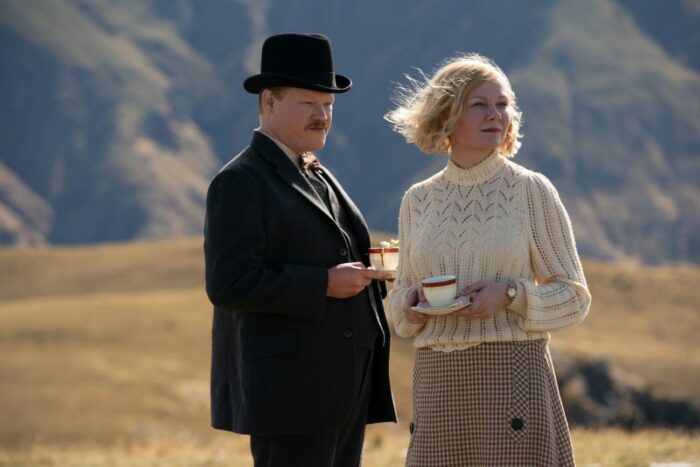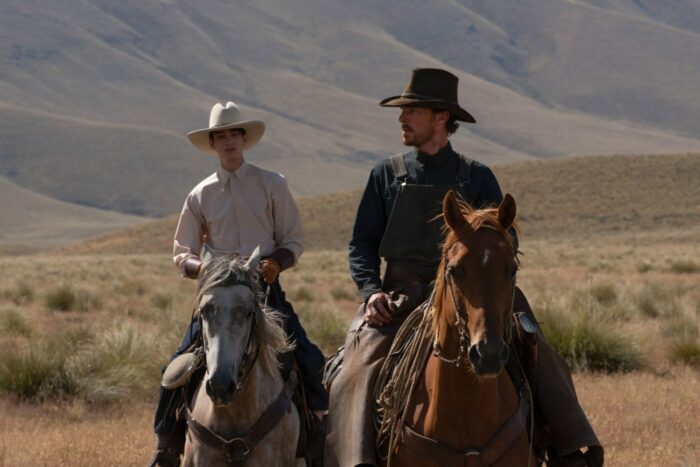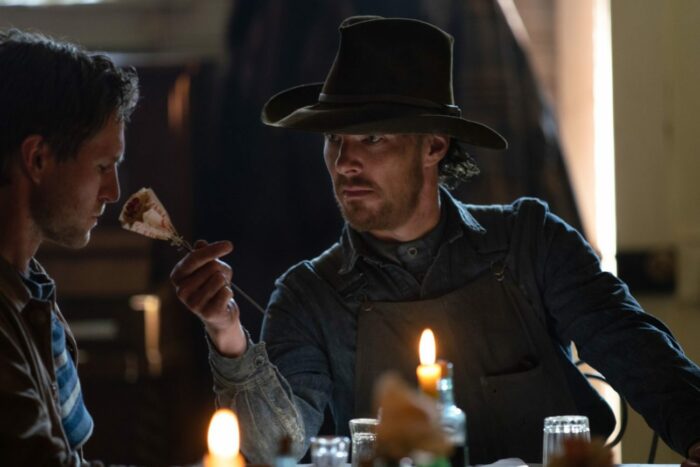Floating like an intoxicating mist in the meadow of cinema is the irresistible vapor of slow-burn cinema. A shade more pungent than the fog of aimless slow cinema itself, this smokier variety, Jourdan Aldridge of Premium Beat described the genre as a “filmmaking style, usually in narrative productions, wherein plot, action, and scenes develop slowly, methodically toward a (usually) explosive boiling point.” There’s a sect of astute cinephiles that welcomes every molecule of that approach. They will deeply inhale Jane Campion’s The Power of the Dog in theaters and on Netflix as it lingers through this awards season. Others will rightly be impressed by the air of it all only to still squint, cough, and wander astray in its blur.
Based on Thomas Savage’s 1967 western tragedy, the year is 1925 on the cattle drive trails of Montana. Two brothers, one refined, the other rough, both tutored by the same mentor: a highly spoken-of but long departed “Bronco Henry,” have been ranching across this state for a quarter-century together. George Burbank (Jesse Plemons of Game Night) is the suited businessman making sure details and affairs are in order at every stop. His refined brutish brother Phil (the top-billed Benedict Cumberbatch) is the strict and forthright one getting his hands dirty to keep everything moving at all times. The two Burbank brothers couldn’t be farther apart in goals, talents, and temperament and carry a mostly unspoken drama.

Approaching 40 and carrying a “fatso” nickname, George appears to be growing tired of the long rides. He is soft-spoken and has become smitten by a demure widowed innkeeper named Rose Gordon (Kirsten Dunst, in her first feature in four years), in whom he sees a chance to settle down. Meanwhile, Phil feigns an educated background between the dirt and chaps. He lives fully in the grinding work with ferocity and seriousness that leads and scares others.
Phil is unforgiving with admonishments towards his brother or any man who cannot match his dedication, commonly bending ears with macho tales of Bronco Henry like he’s a mythic “Bill Brasky” Saturday Night Live bit. One of those men Phil sees and targets as lesser is Rose’s antsy teenage son Peter (Kodi Smit-McPhee of Let Me In). The effeminate young man with less-than-rugged fashion sense (wearing sneakers in a sh-t-kicker boot world) and confidence who enjoys writing and papercraft art. When George marries Rose, Peter is now trapped by Phil’s caustic presence and the rancher’s persistent spite infiltrates everyone’s minds. That’s when two forms of contaminating menace take over the slow burn of The Power of the Dog.

Benedict Cumberbatch encapsulates the forest of simmering fires within Phil. There are times his unflinching body language does the talking. Other times, he pushes Phil’s abruptness vocally and physically. Phil will think low of Rose and call out her alcoholism and depression. He will try to man the bullied Peter up and teach him points of the rancher’s trade. When conformity to his will or wishes are not met, the emotional explosions are volatile and impressive from the London actor.
At every point Cumberbatch’s Phil appears to be the cocksure rock everyone else breaks themselves against, something stewing internally or elsewhere will erode the granite more effectively than snapped lightning bolts. People like Phil will point to the history supposedly held within the surrounding mountains as if the evil is around them when it could very well be right in their midst. Quiet menaces, like Kodi Smit-McPhee’s daring performance, can cause equal damage to a loud one, as seen in the rampant sorrow, malaise, and, eventually, plotted revenge brewing in Campion’s chosen course through this novel.

From a filmmaking standpoint, Jane Campion has not missed an artful step in the twelve years since her last feature. The foreboding vistas of New Zealand stand in for the American West in this ruminating affair, and they are captured with staggering beauty bordering on surrealism by cinematographer Ari Wegner (Zola, True History of the Kelly Gang). The same can be said for Jonny Greenwood’s shrewd score, a orchestral work far more keyed into its setting than his meandering musical kaleidoscope work from Spencer. The entire film looks and sounds the part without much business picking up.
Calling down the inspirational Biblical thunder of Psalm 22:20 that swings like a pendulum between beloved darlings delivering souls and the deadly teeth of sin, The Power of the Dog allows straight rancor to build its texture of smoke, one devoid of carnal violence. You have a western that doesn’t pull a trigger to make its points. It kills without blades or bullets. Call it a woman’s touch, if you must, but that would be dismissive when you consider the source material and its notable twists.
When combining the concentration of disquiet with the slow-burn technique, menace can only burn so far. Built in short chapters with little time skips or transitions, The Power of the Dog licks more cigarette wrappers in dramatic confrontational establishments than Denis Villeneuve lifts and lands flying vessels in Dune. Whatever is in those papers when lines like “a man is made by patience and the odds against him” are delivered, the burn is drastically slow.
No matter how gorgeous and well-acted the film is, The Power of the Dog is like a small 30-count cardboard matchbook people used to fold into their pockets. They’ll strike and light on fire, but with less heat and sturdiness than a firm wooden match from a box. The long, contemplative coup of a narrative in Campion’s film is like letting those cardboard matches burn in the hope it singes your finger with excitement only for a little breeze to put it out where you need to light another, and then another over and over. There’s true slow-burn with promise and then there’s this overly slight and insubstantial tension.



